Strasbourg, while a wonderful city, does come with its disadvantages. Due to its position on the German border, and merely a few hours’ away from Luxembourg and Switzerland too, it’s well-located in that sense and fairly ideal if you like skiing. However, when it comes to sun worshippers whose ideal holiday is one where sunglasses are worn for the sun rather that snow glare, it’s not quite as ideally situated. The nearest coastline is around 600km away at Calais, so even if you’re looking for a nearby practical beach location, the prospects are pretty grim.
Now while I didn’t actually get to go to the beach when I was in Bordeaux last weekend, I did get to glimpse some much needed sun and top up on my Vitamin D for the next 3 months. While we may not have snow like C. S. Lewis’ Narnia, I can most definitely relate to the idea of an eternal winter. Sadly I’m not exaggerating when I say that I saw direct sunlight in Strasbourg twice in the month or so before I went back to the UK for Christmas. People in the UK complain about the weather, and while it does rain rather a lot, it’s also sunny, whereas Alsace seems to be perpetually grey at this time of the year.
And so I set off for Bordeaux, going there not only in hope of seeing of some literal sun there, but also in the metaphorical sense of getting to see Tess and some of my other friends from Oxford for a weekend.
In order to make the most of my time in Bordeaux and so that I could take the cheapest and simplest option of getting there, I left Strasbourg at 07:46 on Saturday on a train that would take just under 7 hours to cover the 1000km or so of French railway lines that link Strasbourg and Bordeaux. Think of it as a long-haul flight, except a train journey and a domestic one at that.
Thankfully I’d managed to find one of the few direct trains from Strasbourg to Bordeaux, so that meant I didn’t have to bother with changing at any point, which would most likely have been Paris. Given that I’d booked the tickets a while ago, I was glad to have made that decision when just a few days before I went to Bordeaux, the terrorist attack at the Charlie Hebdo office in Paris and the subsequent attacks elsewhere took place. If nothing else, I later realised that if I had opted to take two trains instead, I would’ve had to change train stations in Paris, and two stations in question happened to be just on either side of the giant solidarity rally that was taking place on the Sunday. I wouldn’t have fancied my odds, trying to make my way through the vast crowds with a rucksack and a small suitcase…
My train journey there and back mainly consisted of lesson planning (ah, the joys of being a teaching assistant!), watching programmes on BBC iPlayer (I’d downloaded them. What, you thought I’d have internet on a French train? Ha! Don’t be ridiculous…), reading, and writing. The latter ended up in resulting me talking to the person I was sitting next to (I know, talking to another human being on public transport. Oh, how my British heart quivers at the very thought!). She’d seen I was writing a considerable amount in English (well, I never pretended these blog posts would be short. I am nothing if not loquacious) and so paused what she was watching to ask me if I was indeed writing English, and then where I was from. We ended up chatting for a good half an hour or so, and it turned out that she was a Chemistry student at the University of Strasbourg, so we added each other on Facebook, before she then got off the train less than an hour into the journey at her stop. I later realised that this really had been a chance encounter, as I was in fact sitting in the wrong seat (French trains have an odd seat numbering system, whereby each seat has two numbers that switch, so that the seat numbering always starts at the front of the train after the direction of travel).
Having found some cheap flights from the UK at the beginning of January, Tess had invited a load of our friends from Oxford to go and visit her in Bordeaux on that weekend, hence why I was also going then. However, Tess works a pretty full day on a Friday and so the combination of that plus me having lessons first thing on a Monday morning meant that I had to get the last train back on the Sunday, so all in all, I only got to spend a little over 24 hours in Bordeaux.
Once I’d arrived in Bordeaux after what had felt like rather a long time (I stopped counting down the hours after I got into Hour 3 of the journey), I parted from my fellow passengers, exchanging the single nod of solidarity with the others who had been there with me from the beginning, I found myself a tram and headed into the centre of the city where I’d arranged to meet Tess. Much to my disappointment, it started to drizzle, so I huddled under my umbrella whilst waiting underneath one of the city’s many grand portes for Tess to appear.

One of the city’s portes.
Reunited at last, we headed back to Tess’ flat, where we proceeded to enjoy a good cuppa and have a grand old natter and a catch up for a while. The rain eventually eased off, so we headed out into the city so I could get a look around at some of the major sights in the centre, and so Tess could pick up a few bits she needed from the supermarket.
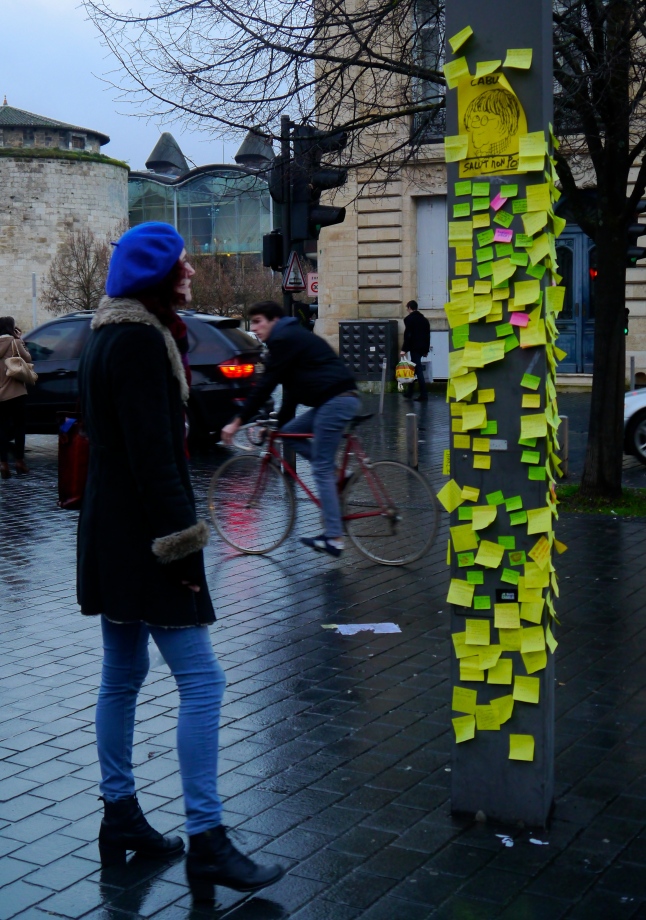
There were signs and post-it notes up everywhere in response to the Charlie Hebdo attack.
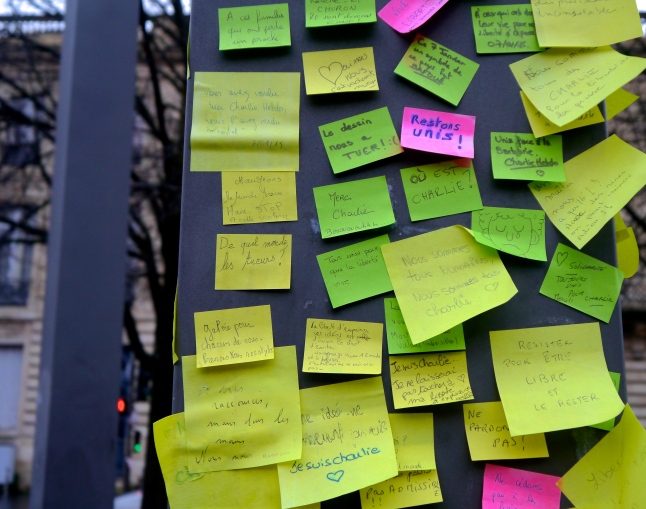
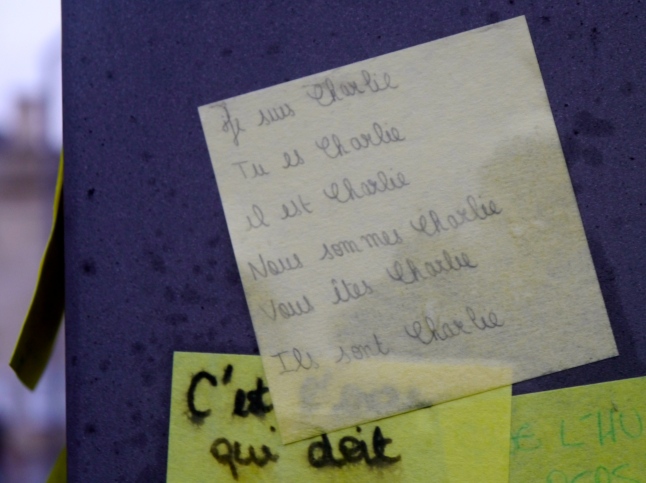
As a language learner and now teacher, this one particularly spoke to me.

Tess looking very chic with her French beret and middle-distance stare.
As the Oxford lot were getting in at about 7:30pm and the airport was a fair way outside of the city centre, Tess and I hopped on a bus and headed over to meet them at the airport, chauffeur-style sign whilst waiting in Arrivals and all. Once we’d found them, we jumped back on the bus and went back to Tess’ via their hotel so that they could check in and drop off their bags. For the sake of speed and convenience, and to avoid trying to figure out another way to feed 8 guests plus her friends in Bordeaux, Tess had decided to order in takeaway pizza for dinner. Given that we had a few vegetarians and even a vegan or two amongst the party, this proved more complicated than it might otherwise have been, but everything worked out well. Although takeaway pizza may not sound the most glamorous of welcome meals, the Year Abroad had clearly had an impact on Tess, and the oft tipsy organiser of a college bop’s charity predrinks had blossomed into a prepared and welcoming hostess, having bought in beer and wine in advance, along with a variety of nibbles served in ceramic bowls to accompany our dinner. (To those of you who know Tess, fear not: I still ended up looking after her phone later in the evening, as I’ve become accustomed to doing.)
Much to Tess’ horror, it was only the second time I’d had red wine to drink of an evening since arriving in France back in September. Given that I’m in Alsace, a wine region primarily known for its lighter, floral-noted white wines, I wouldn’t say that it’s that surprising. Nevertheless, I took the opportunity to avail myself of several glasses of Bordeaux red wine. Well, when in Rome…
In addition to chatting to various friends from Oxford, I enjoyed getting to meet some of Tess’ friends in Bordeaux, most of whom were assistants too. Of course, this led to the occasionally slightly awkward explanation of the fact that I was a friend of Tess’ from Oxford, but I was actually working as a teaching assistant in Strasbourg, but it meant that we got to swap stories and see how things are done in other parts of France. After she’d tricked me into believing that it was considered customary in France to stop what you’re doing and stand up every time someone new enters a room, I got on rather well with Lucie, one of Tess’ closest friends in Bordeaux and about whom I’d already heard some stories of their shared antics.
As the evening drew on, we ended up heading out to a cocktail bar in the city, where we met up with more of Tess’ friends, and I soon got chatting with them in French, an endeavour made perhaps more interesting by the unfamiliar accents and loud music in the background. When the bar closed at about 2am, the group of us went over to one of Tess’ friends flats for a bit. Given that by this point, most of Tess’ assistant friends in Bordeaux had gone home or elsewhere, we were left with the Oxford group and then some of Tess’ French friends, making communication between the two groups a little difficult linguistically at times, but we managed well enough. At one point, a bottle of rather powerful homemade schnapps was produced and passed around, and we chatted and listened to music for a while longer, before heading off after about an hour there. It had been a long day of travelling for a lot of us, so we sent most of the Oxford lot off in the direction of their hotel before heading back to Tess’ apartment. It was just after 3am by the time we got in, which despite the long day’s travelling was actually my latest night of the Year Abroad so far… I’m a wild one, me.
After being woken up by bright sunshine coming in through the window, a phenomenon I am very much unfamiliar with in my shuttered north-facing Alsatian apartment, I got up and went to the nearby supermarket to buy my dinner for the train journey back later, as well as some pain au chocolat for breakfast. We had a rather late breakfast, before meeting up with the others in the city centre. Tess gave us a brief walking tour of the city, albeit a longer and more detailed one that the highlights version I’d received yesterday, and also a sunnier one as the celestial orb had finally decided to make an appearance.

Seriously, look at the difference in the weather over the two days.

This is the same tower.
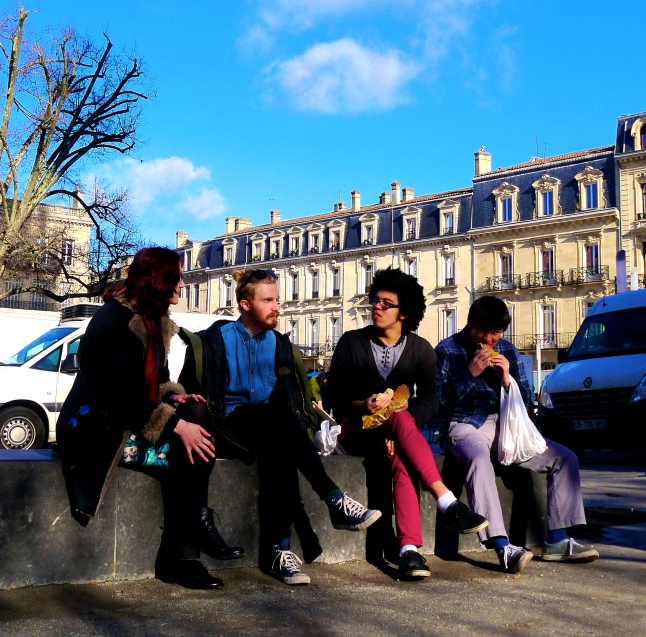
Part of our walk took us past the Place des Quinconces, the area where the Bordeaux solidarity rally for the Charlie Hebdo terror attacks was taking place, so we saw the masses of people beginning to congregate there in preparation as we walked past on our way towards one of the city’s parks.

The beginnings of the rally.
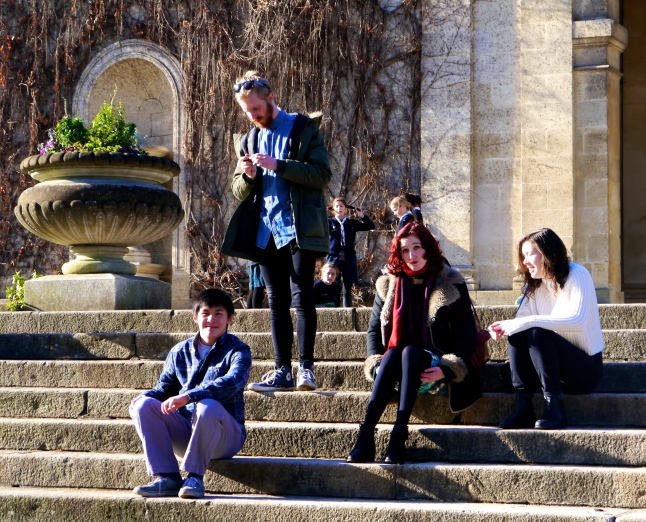
Look at these cool cats.
Sadly, I didn’t get to spend too long enjoying the sunshine in the park, as by that point it was getting close to when my train was due to leave, so I said my goodbyes there and hurried back to Tess’ to collect my bags. In reality, this was more of a poor imitation of an action film, whereby I had to dart through the crowds coming towards me to get to Tess’ apartment on the other side of them. Thankfully the modern age of technology and smartphones meant that I could just head for the quietest streets I could see and not get horrendously lost in the unfamiliar city.
The hurrying became distinctly less action-film, and rather more unflattering romcom, when I got to the tram stop to find out that the trams weren’t running in the direction I needed because of the rally happening near a stop further up the line. Having failed to think of this in advance and leave sufficient time to walk calmly to the train station, I ended up running, wearing more layers than frankly was necessary anyway, given the sun’s noticeable presence, and trailing my wheeled suitcase behind me. Thankfully I made it to the train station on time, having even had enough time, or perhaps more appropriately breath, to help a couple who were also trying to find the train station after the trams had let them down too. After alternating between powerwalking and just flat out running along the streets of Bordeaux, following the tram tracks that I knew would lead me to the train station, I got there and found my seat on the train with a few minutes to spare. Of course at this point, Sod decided to get involved, and the train didn’t actually set off until about 15 minutes after the advertised time of departure, but regardless, I made it. I would like to take this opportunity to apologise to the people sitting in the nearby vicinity on that train on Sunday afternoon, being forced to put up with panting, sweaty hot mess that flung itself most unceremoniously onto the train and proceeded to remove as many items of clothing as it socially acceptable. Seeing the large monument where the rally was congregated as the train headed out of the city and realising that it was about 2.5km away from the train station, I nearly wept at the realisation, but by that point I didn’t think I could spare the moisture.
I spent part of the journey back reading further about the response in France and worldwide to the Charlie Hebdo attacks. I’d already noticed the aftermath to some degree: the four Tricolore flags I see on my 10 minute walk to work everyday had been at half mast from the Thursday until the Monday after the attacks, and as I live in the Jewish neighbourhood of Strasbourg, there have been armed soldiers patrolling the main areas nearby. It did feel a little bit closer though when I looked up from my screen to see that we had stopped at a station just outside Paris on the way back to Strasbourg though.









